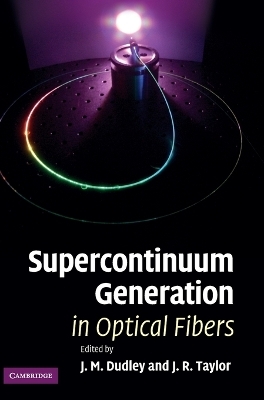
Supercontinuum Generation in Optical Fibers
Cambridge University Press (Verlag)
978-0-521-51480-4 (ISBN)
The optical fiber based supercontinuum source has recently become a significant scientific and commercial success, with applications ranging from frequency comb production to advanced medical imaging. This one-of-a-kind book explains the theory of fiber supercontinuum broadening, describes the diverse operational regimes and indicates principal areas of applications, making it a very important guide for researchers and graduate students. With contributions from major figures and groups who have pioneered research in this field, the book describes the historical development of the subject, provides a background to the associated nonlinear optical processes, treats the generation mechanisms from continuous wave to femtosecond pulse pump regimes and highlights the diverse applications. A full discussion of numerical methods and comprehensive computer code are also provided, enabling readers to confidently predict and model supercontinuum generation characteristics under realistic conditions.
John Dudley is a Professor in the Département d'Optique P. M. Duffieux at the Université de Franche-Comté and CNRS research institute FEMTO-ST in Besançon, France. His research has spanned both experimental and theoretical nonlinear optics and photonics. Roy Taylor is a Professor in the Physics Department at Imperial College London. He has made contributions in various aspects of laser research, photonics, ultrafast processes, optical fibers and nonlinear optics.
1. Introduction and history J. R. Taylor; 2. Supercontinuum generation in microstructure fiber - an historical note J. K. Ranka; 3. Nonlinear fiber optics overview J. C. Travers, M. H. Frosz and J. M. Dudley; 4. Fiber supercontinuum generation overview J. M. Dudley; 5. Silica fibers for supercontinuum generation J. C. Knight and W. Wadsworth; 6. Supercontinuum generation and nonlinearity in soft glass fibers J. H. V. Price and D. J. Richardson; 7. Increasing the blue-shift of a picosecond pumped supercontinuum M. H. Frosz, P. M. Moselund, P. D. Rasmussen, C. L. Thomsen and O. Bang; 8. Continuous wave supercontinuum generation J. C. Travers; 9. Theory of supercontinuum and interactions of solitons with dispersive waves D. V. Skryabin and A. V. Gorbach; 10. Interaction of four-wave mixing and stimulated Raman scattering in optical fibers S. Coen, S. G. Murdoch and F. Vanholsbeeck; 11. Nonlinear optics in emerging waveguides: revised fundamentals and implications S. V. Afshar, M. Turner and T. M. Monro; 12. Supercontinuum generation in dispersion varying fibers G. Genty; 13. Supercontinuum generation in chalcogenide glass waveguides Dong-Il Yeom, M. R. E. Lamont, B. Luther Davies and B. J. Eggleton; 14. Supercontinuum generation for carrier-envelope phase stabilization of mode-locked lasers S. T. Cundiff; 15. Biophotonics applications of supercontinuum generation C. Dunsby and P. M. W. French; 16. Fiber sources of tailored supercontinuum in nonlinear microspectroscopy and imaging A. M. Zheltikov; Index.
| Erscheint lt. Verlag | 1.4.2010 |
|---|---|
| Zusatzinfo | 82 Halftones, unspecified; 102 Line drawings, unspecified |
| Verlagsort | Cambridge |
| Sprache | englisch |
| Maße | 179 x 254 mm |
| Gewicht | 980 g |
| Themenwelt | Naturwissenschaften ► Physik / Astronomie ► Optik |
| Technik ► Elektrotechnik / Energietechnik | |
| ISBN-10 | 0-521-51480-0 / 0521514800 |
| ISBN-13 | 978-0-521-51480-4 / 9780521514804 |
| Zustand | Neuware |
| Haben Sie eine Frage zum Produkt? |
aus dem Bereich


